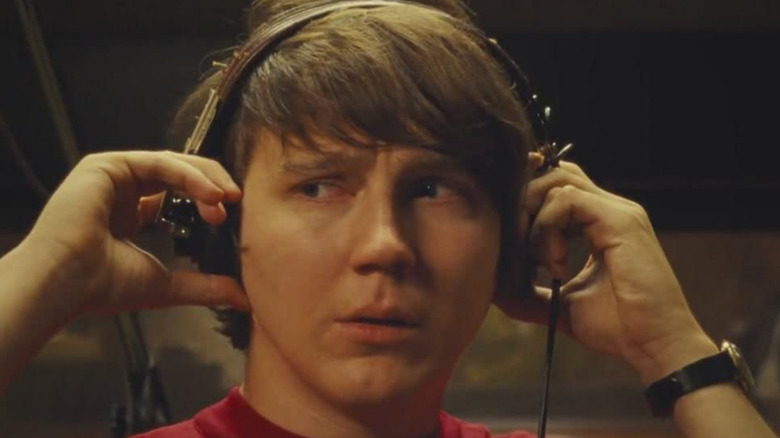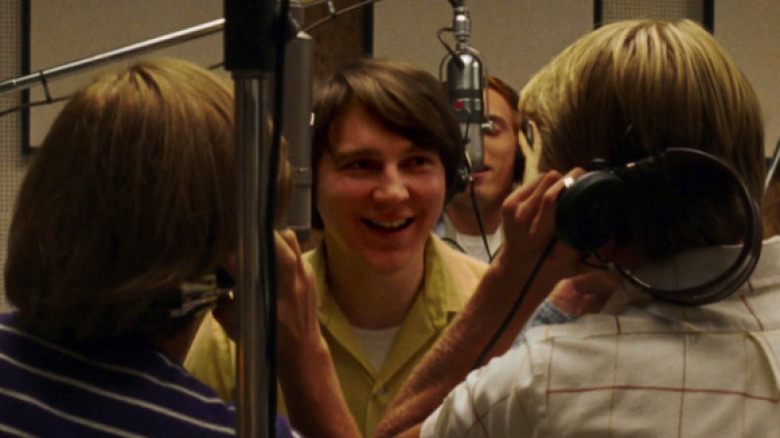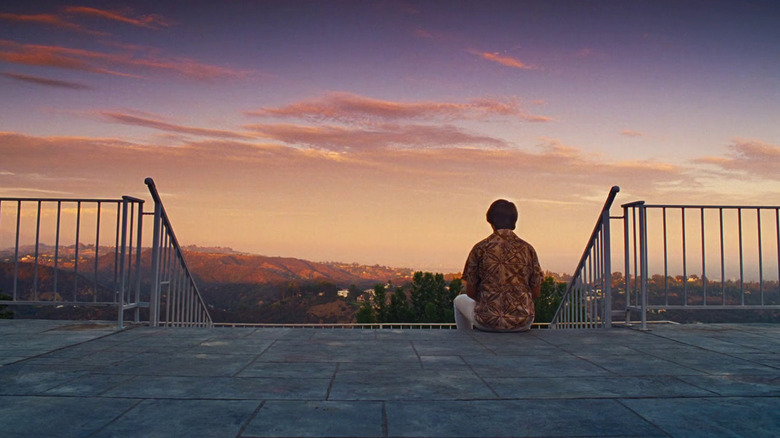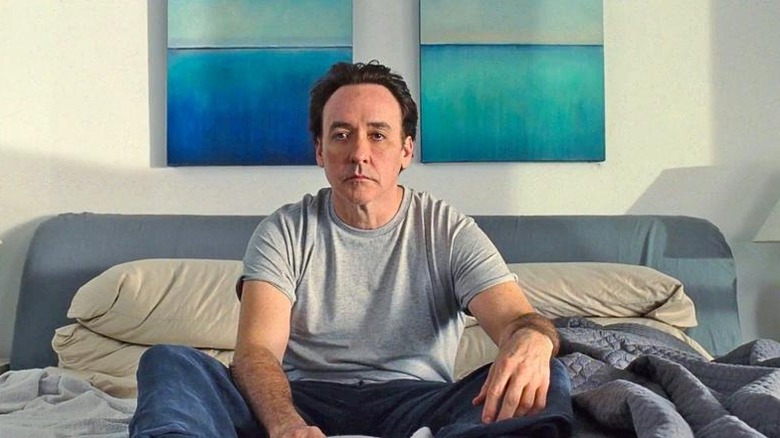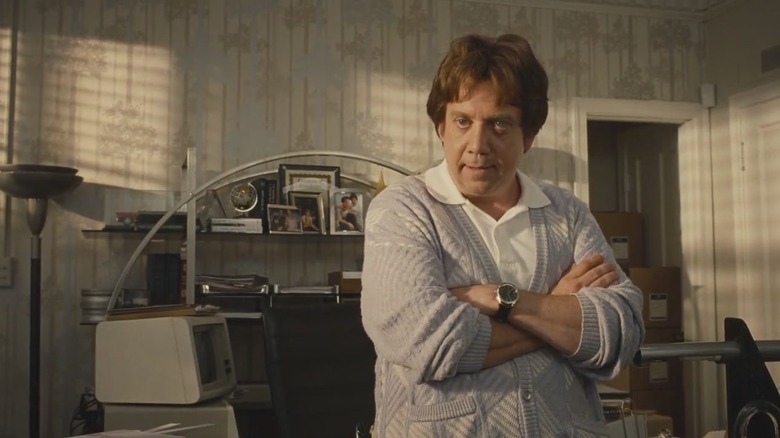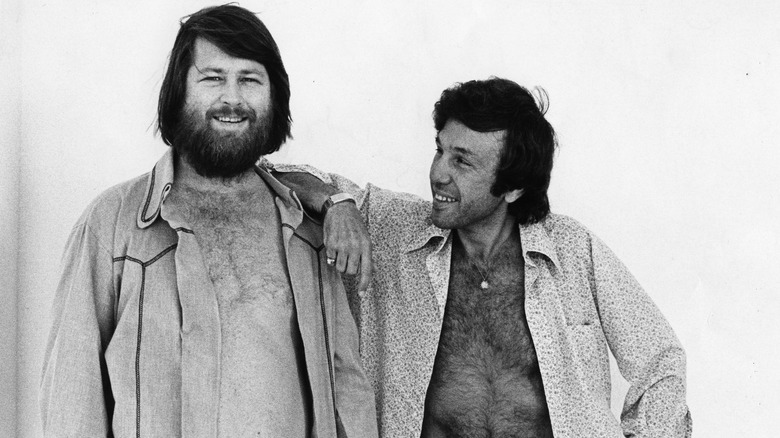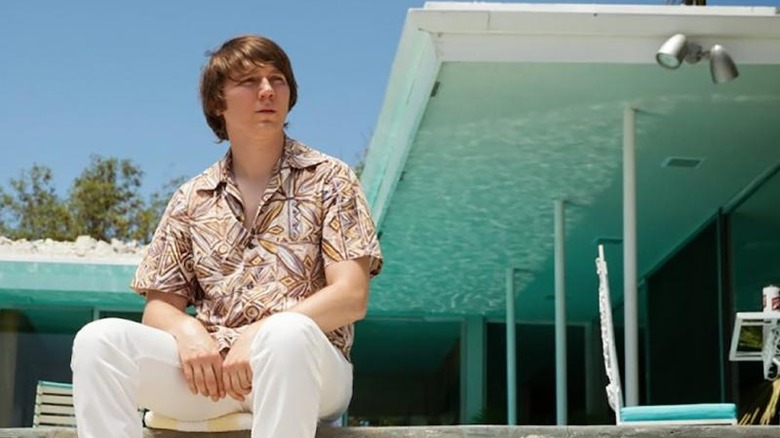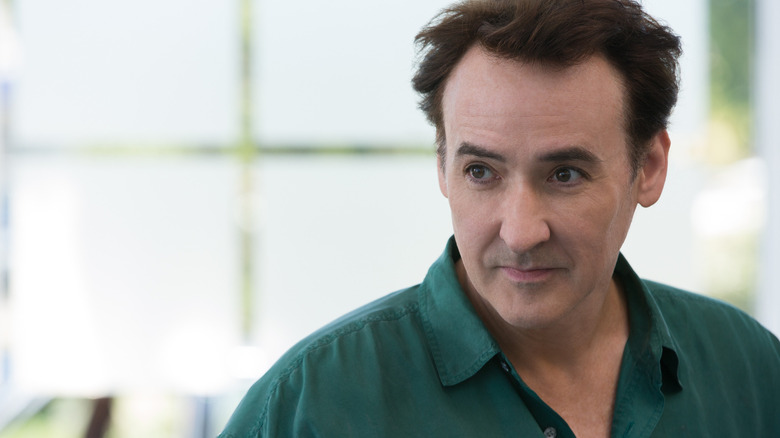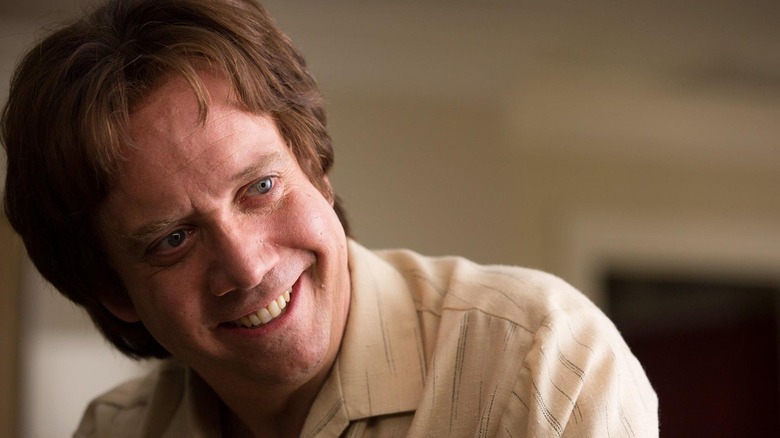The Untold Truth Of Love & Mercy
Bill Pohlad's 2014 feature "Love & Mercy," about singer-songwriter and co-founder of the Beach Boys, Brian Wilson, is far from a conventional biopic. Instead of following a traditional structure to showcase Wilson's most significant life and career moments, the director opted for a different approach. The film shows two brief but defining periods of Wilson's life in the 1960s and the 1980s — casting two actors for the leading role who look nothing alike: Paul Dano plays the musical legend in his younger days when he is filled with passion and inspiration, while John Cusack portrays the older version of the icon as he experiences mental unwellness and other personal issues.
The dynamic between past and future creates a beautiful and unique symphony here. Much like the often chaotic yet fascinating creative process Wilson is shown going through while composing music and recording songs, his genius just comes through perfectly in this feature. Although making this movie wasn't a straightforward process, the result speaks for itself. The dedication from the creators, cast, and crew is apparent throughout, which makes this biopic an absolute triumph.
Here, we gathered some trivia and lesser-known facts about "Love & Mercy" that fans of the Beach Boys will surely appreciate greatly.
If you or someone you know is struggling with mental health, please contact the Crisis Text Line by texting HOME to 741741, call the National Alliance on Mental Illness helpline at 1-800-950-NAMI (6264), or visit the National Institute of Mental Health website.
Brian Wilson wasn't involved but had high praise
Interestingly, Brian Wilson was never directly involved in the movie's development and production. According to an interview he gave to the Boston Herald in 2015, the musician claimed that while he was not involved in making the movie, the feature was factual, which couldn't have been an easy task to get right for the screenwriters.
In another interview with the LA Times, he explained that it was challenging to watch some of the scenes in the movie, saying, "[It was] quite an emotional experience because of all I went through, all those different kinds of trips I took." Despite reliving some of the worst periods of his life, he acknowledged the biopic and its accuracy, praising the actors who played him — Paul Dano in particular.
Wilson wasn't the only one to like the end results, though. The film's unusual style, tone, and structure paid off, and critics loved it. It was also a commercial success, making over $28 million on a $10 million budget.
Screenwriter Oren Moverman consulted with Melinda Ledbetter
Although Brian Wilson himself wasn't involved, his second wife Melinda Ledbetter (portrayed by Elizabeth Banks) certainly was. As Wilson told Boston Herald, "I had no control or involvement in the film, but my wife did. She made sure they cast the characters right, you know, so they could capture my personality and the records and stuff like that."
While screenwriter Oren Moverman was in the middle of penning the script, he reached out to Ledbetter. In an interview with Collider, Moverman explained how they approached the story of the film in order to have the right amount of accuracy they aimed for from the beginning. According to him, everything we see in the final cut is based on extensive research and facts, although specific periods were shown more briefly than how long they actually went on in real life.
Due to the consultation with Ledbetter, a crucial part of the plot (which tells how Wilson and his second wife met and what kind of relationship they had) is based on experiences that truly happened. As Moverman said, "I talked to Melinda, and she told me all these stories and I just transformed them into scenes — meeting at the Cadillac Theater, jumping off that boat and swimming — all those things really happened, at least in the way she told them."
The recording process is painstakingly accurate
One of the most fascinating aspects of "Love & Mercy" is when we see the young Brian Wilson construct music during studio sessions. The film does a meticulous job of portraying the process and how Wilson came up with some of the most iconic tunes ("Good Vibrations, "God Only Knows," etc.) — which later became essential parts of pop culture. His deep knowledge of instruments and sounds combined with great talent is undeniable. Paul Dano gives a spectacular performance to bring this whole experience as close to the viewer as possible. We witness how Wilson played around with several instruments to concoct just the right combination of sounds in the way he heard them in his own head.
In his 1971 profile written for Rolling Stone, journalist Tom Nolan described Wilson's music-making process in great detail. He wrote about how ecstatic Wilson could be during a recording session, going around and showing each player what he'd like them to play. It might've seemed chaotic from an outside perspective, but he was in complete control. He often took over the board in the booth to mix the tracks even in the middle of a recording. He was the quintessential musician — a true genius. This definitely resembles what we see in the film and why Wilson complemented its accuracy (not only the sensitive and emotional parts but also the ones that show him playing music and singing).
Initially, the script was 170 pages long and had 100 songs in it
The theatrical version of "Love & Mercy" closes in on two hours, but the first draft of the screenplay was a lot longer than that. According to Collider, when Oren Moverman finished the first draft, it was 170 pages long and featured 100 songs. But even with such an extreme length, he felt that he didn't do justice to Brian Wilson. He said, "Actually, the first draft that I wrote was almost 170 pages, and I felt it was too short. I remember sending an email to Bill [Pohlad] saying, 'Here's the first draft attached, I feel it's too short.' It had 100 songs and 170 pages and I just felt like I didn't do enough to tell the story."
However, Pohlad told Moverman that he overperformed and did a 150% job. So, after a long conversation between the two, Moverman managed to cut down the script for the right length — which included the most significant points to tell an accurate yet condensed story of Wilson and his most influential and important relationships.
Most of the deleted scenes portrayed Wilson in the 1970s
A shorter script also meant that Oren Moverman had to get rid of some great material. Most of these outtakes took place in the '70s when Brian Wilson was going through the toughest period of his life. He was physically, mentally, and emotionally down, awfully depressed for years, not doing much of anything that would've moved his music career (or life) forward. The myth was that he spent four years in bed in his bathrobe.
Moverman wanted to set the record straight that Wilson might've not done anything exciting or significant musically, but he still did things besides curling up in his room. He said, "He spent four years in bed, not a lot was going on, but it was also demystifying that because he wasn't really in bed all the time. He was eating, and he was doing drugs and drinking and staying in bed and being depressed all the time, but he would walk out of the house in his bathrobe. He would go to clubs, he would listen to music, he would interact with some people."
We don't see much of that in detail in the movie; however, the way Wilson is portrayed in the '60s and '80s implies effectively what went wrong in the '70s — and why Dr. Eugene Landy came into the picture.
If you or anyone you know is struggling with addiction issues, help is available. Visit the Substance Abuse and Mental Health Services Administration website or contact SAMHSA's National Helpline at 1-800-662-HELP (4357).
Paul Giamatti's portrayal of Dr. Landy frightened Brian Wilson
Paul Giamatti's skill to scare us to our core maybe wasn't as well-known back in 2014 as it is today, but he did maximize that ability in "Love & Mercy." He played the infamous psychotherapist, Dr. Eugene Landy, who treated the Beach Boy for many years. It's really tough to watch some of his scenes as he controls and intimidates the singer with a very strict hand.
In an interview with FOX 7 Austin, after seeing the film for the first time, Wilson explained that some of it was a little rougher to watch since certain characters were truly realistic to their real-life equivalents. He said, "The guy who played Dr. Landy was so right on ... so true to life, that he absolutely scared me. I was absolutely in fear for about 10 minutes."
The real-life Dr. Landy was suspended from medical practice by court
Despite how abusive and domineering Dr. Landy seems toward Brian Wilson in the film, he'd been even worse in real life. In an interview Melinda Ledbetter gave to the New York Post, she said, "After I first saw the film, I had to just drive around for a couple of hours to clear my head. Then I remembered that what Landy did to Brian was even worse. You don't get a sense of it in the movie, but it happened on a daily basis for years."
Landy had a doctorate in psychology and treated celebrities like singer Alice Cooper and actor Rod Steiger. In 1975, he was hired by Wilson's first wife to help him battle his drug addiction, physical unfitness, and abnormal behavior. He (mis)diagnosed him as a paranoid schizophrenic and began to heavily medicate him. By 1989, he became the Beach Boy's legal guardian and manipulated Brian to an extreme level. According to the Boston Herald, in 1992, a court ruled that Dr. Landy could no longer practice in California, and he was also banned from contacting Wilson due to a lawsuit filed against him by Wilson's family.
Surprisingly, though, Wilson doesn't hold any bad feelings towards his ex-doctor, despite Landy's abuses. Wilson said, "He wouldn't let me do anything except exercise and eat healthy foods... He was a great doctor. He died about eight years ago, and that came as a shock to me. He meant well. He just yelled a lot, you know."
Paul Dano didn't know as much about Brian Wilson as he thought
In "Love & Mercy," we get to see insightful bits of Brian Wilson's dysfunctional relationship with his father, Murry Wilson (played by Bill Camp), and other personal differences that often led to conflicts between him and his cousin, Mike Love (Jake Abel). In an interview with Variety, actor Paul Dano admitted that although he was a fan of the band, he didn't have as much knowledge of the singer-songwriter as he thought.
Dano explained that it was a pleasant and wonderful surprise to read the script and get to know Wilson, "I felt like I knew the music, you would think you would know the story behind the man who made it. And I think that was the first truly exciting thing, not just even as an actor, but about the film. Like, wow, this guy has been through it and got a story. A story that would move and surprise people." He also said that when he read the script the second time, he did it with the band's famous album, "Pet Sounds," playing in the background, which was the moment he really started to prepare for the role.
The film doesn't always specify what Wilson used over the years
We don't see much of the other Wilsons — Carl and Dennis, who were also part of the band — in the film, however, Brian Wilson's relationship with his cousin Mike Love is an essential element of the script. As the plot moves forward, Love becomes more and more frustrated with Wilson's strange behavior and obsession with perfectionism. He just simply can't deal with his cousin's issues and the excessive drug use.
According to Slate, although "Love & Mercy" doesn't always detail the kind of drugs Brian had taken over the years, it includes various substances in addition to LSD. In a 2016 interview with Rolling Stone, Wilson opened up and talked candidly about his drug use and what it did to his mind. "I want people to realize that drugs can be very detrimental and dangerous. I've told a lot of people don't take psychedelic drugs. It's mentally dangerous to take. I regret having taken LSD. It's a bad drug." He also added that he believes that his "struggle for mental health is the result of bad drugs."
If you or anyone you know is struggling with addiction issues, help is available. Visit the Substance Abuse and Mental Health Services Administration website or contact SAMHSA's National Helpline at 1-800-662-HELP (4357).
Dr. Landy was a cartoon and fraud in real life
There's a lot to the abusive and exploitative relationship that went on for years between Dr. Landy and Wilson. According to Far Out Magazine, by 1983, Landy wasn't simply Wilson's therapist but also became the Beach Boys' business manager, co-songwriter, and executive producer, too. He had total control over Brian Wilson's mind and body, keeping him in constant fear. Landy was also a master manipulator who once dreamed of his own musical stardom but had neither the talent nor the work ethic to follow through. He was greedy and compulsive, hungry for fame and success that he didn't deserve.
Screenwriter Oren Moverman told Collider why Landy's part was the hardest to write and capture in "Love & Mercy": "Even though many things that he says in the movie I actually have a recording of, in real life, he was a cartoon, and he was so over the top," he said. "You kind of wonder, "Did everybody miss it?" I think it's so clear the guy is a fraud, a manipulator, out of his mind, probably drugged even more than Brian, and where is everyone? Where is everyone to kind of call him out and say, "Wait a minute, he's ruining Brian's life, and he's cutting him away from his family?" Indeed, the result was a character that affected even the real-life subject of the story, so he must've gotten it just right.
